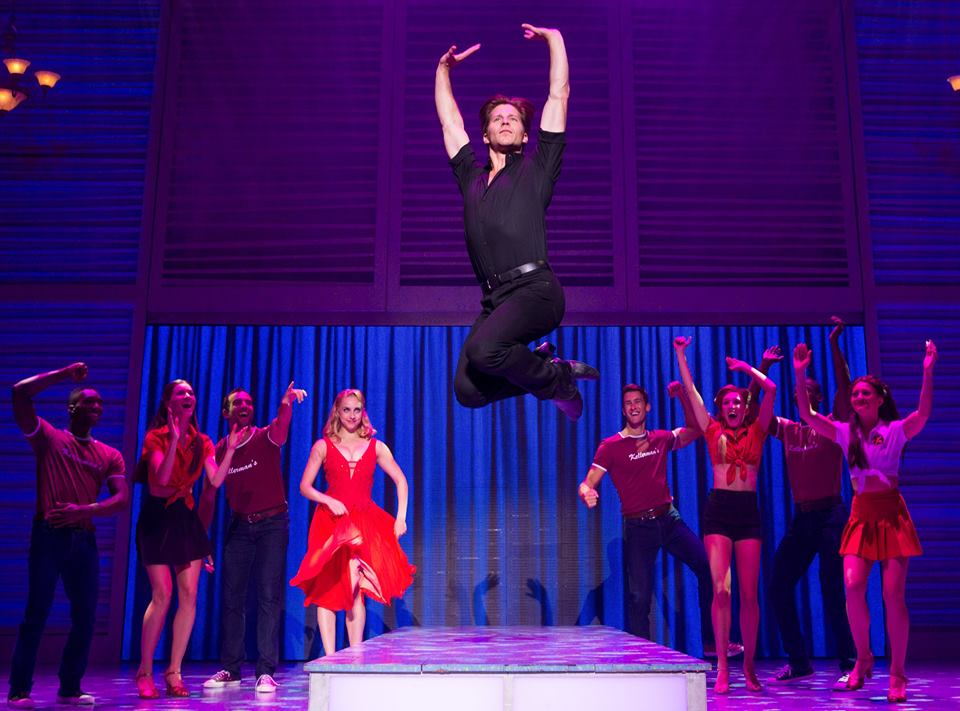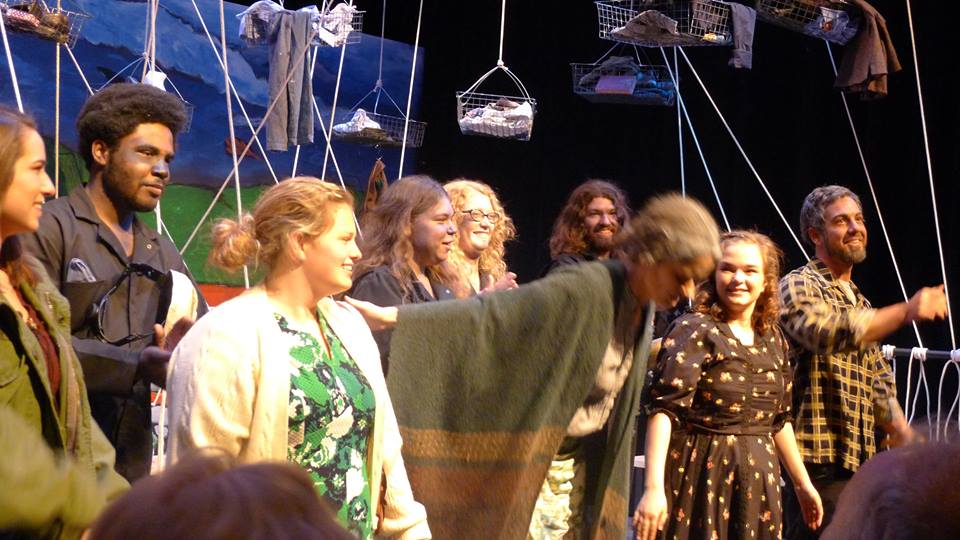A Bright Room Called Day
By Tony Kushner
Directed by Hallie Dizdarevic
Review by Keith Waits
Entire contents copyright © 2016 Keith Waits. All rights reserved.
Zoe Peterson, Andrea Lowry, & Sadie Lawrence in A Bright Room Called Day. Photo by Isaac Spradlin.
After opening their season with a production of Tartuffe projected as especially relevant to current events, Commonwealth Theatre Center next brings us Tony Kushner’s 1987 play, A Bright Room Called Day, which is positioned as an even more direct commentary on the noxious political atmosphere in America. The play is based on Bertolt Brecht’s 1938 work The Private Life of the Master Race, and documents the frighteningly rapid rise of the German Third Reich in 1932-33.
But Kushner does something that probably seemed radical in 1987: interjecting contemporary scenes of a teenage activist, Zillah (Zoe Peterson) that draw parallels between Ronald Reagan and Adolf Hitler. Of course, such comparisons have become commonplace in the last few Presidential election cycles, with first George W. Bush, then Barack Obama, and now Donald Trump being characterized by the opposition as like unto Der Fuhrer.
Yet the climate has shifted so much in 30 years that Reagan is now quoted by Liberal Democrats in defense of positions on issues such as gun control, which slightly undermines Kushner’s thesis. It is not difficult to let go of the Reagan association and see that the parallels seem even closer in the intervening years. Zillah’s strident diatribes about the condition of society could easily be about now, and the extensive use of projections includes images from 2016 conflict zones such as Syria.
The main narrative follows a group of liberals working in the Berlin film industry, Hungarian-born cameraman Husz (Joseph Heberle), his lover, Agnes (Andrea Lowry), actress Paulinka (Shannon Bradley). The political options of the moment appear to be the nascent fascists and communism, with these creative personalities drawn more to the ideals of the communists. Agnes is recruited by two of their number, Traum (Jude Stivers), and Malek (Lilly Stanley), although she herself never officially joins the party. As the timeline plays out in the projections, Hindenburg defeats Hitler in the election for President, appoints Hitler Chancellor as consolation, and within a scant two years, Hitler has subverted the system and begun the Third Reich. It stuns you to realize how rapidly this all occurred, and that Hitler was in power for so long before World War II was a reality.
But if Kushner’s point is, in part, how quickly a free society can embrace a dictatorship in the name of security, the Reagan Presidency plays as out-of-date now, and relatively free of totalitarian characteristics in light of the current political discourse. For all of the strength of Hallie Dizdarevic’s production, I almost wish she had fully substituted “the Donald” for “the Gipper” and pushed the polemic to its fullest, if much more obvious, realization.
As an early work of Kushner, the play is interesting for witnessing some of the fantasy elements that would provide crucial definition to his later masterpiece, Angels in America. A spectral vision named Die Alte – which translates as The Ancients, or The Crone, (Sadie Lawrence) is onstage from the beginning, and there is a bravura scene at the end of act one in which Noah Bunch nearly steals the whole play as a most unexpected character that I won’t reveal here. Suffice it say that Dizdarevic’s solid but somewhat conservative staging pulls out all the stops in this scene, fully realizing the broadest framework of Kushner’s story.
Yet the strongest moments are often the quiet revelations, such as when another friend, Baz (Ruairidh Kerr), speaks mournfully about being arrested and the first news of a concentration camp being built. Kerr handles this scene with care and a sound emotional core, describing himself as a, “homosexual and Sunday anarchist,” as he explains his desire to flee the new, Nazi Germany.
The ensemble was consistently fine, all delivering intelligent work. Ms. Stanley brought ferocity to her role that might have pushed a notch too far, but it was committed work nonetheless, and Joseph Heberle’s performance was noteworthy, although he had an edge in that he was able to sport an eye patch, a detail particularly resonant of the period and his profession. Andrea Lowry carries some greater burden in the central role of Agnes, and brings equal parts charm and naiveté to her work that felt on the nose.
Zoe Peterson must struggle for the first half of the play to make sense of why a modern character is intruding on the period piece, even if the correlation is made clear early on, but her energy and authenticity carries through until the play physically and thematically connects Zillah more thoughtfully to the scene in 1932 Berlin. Peterson also has the benefit of playing a character much closer to her own experience than the rest of the cast, who at times delivered academic work that lacked the foundation of emotional understanding that Peterson captures.
Again, not to fault their work, but there is a distinction in the two time periods in how the performances land that may arise from the writing. Kushner’s play has met with mixed reviews, and one criticism may be that his characters in 1932 seem a little removed from the world changing events taking place around them. Or perhaps we are in the habit of demanding greater melodrama and menace when we are dealing with the Nazis, and Kushner’s cool reserve feels so much more intellectual than in other tellings?
The staging was sound, with efficient design work and period-appropriate costumes that might only be faulted for emphasizing the slender youth of the cast. Best of all is the crucial use of projections by Gerald Kean. A potent mix of historical images and written exposition reminiscent of silent film narration, the play absolutely depends on this element to work at all, and Kean’s multi-media work may be the single strongest element of the production.
One of the pleasures of attending Commonwealth Theatre Center (formerly Walden Theatre/Blue Apple Players) is the opportunity to watch young talent develop over time. Depending on the material, it is often the case that when a performance stands out it is because the actor has for the moment let go any teenage innocence and given themselves over to the character in adult fashion. There are several examples of that in A Bright Room Called Day, and it underscores the bold choice for a company of student actors to take on such challenging material. For any company in Louisville to bring an early play from Tony Kushner to the stage would be welcome, but for it to come from CTC only reinforces the importance of their mission.
A Bright Room Called Day
October 13 – 22, 2016
Tickets – Evenings:
$15 adult, $10 student/senior
Matinees (Saturdays and Sundays):
$10 adult, $8 student/senior
Nancy Niles Sexton Stage
Walden Theatre/Blue Apple Players
1123 Payne Street
Louisville, KY 40204
502-589-0084
www.waldentheatre.org
Keith Waits is a native of Louisville who works at Louisville Visual Art during the days, including being the host of PUBLIC on WXOX-FM 97.1/ ARTxFM.com, but spends most of his evenings indulging his taste for theatre, music and visual arts. His work has appeared in Pure Uncut Candy, TheatreLouisville, and Louisville Mojo. He is now Managing Editor for Arts-Louisville.com.





